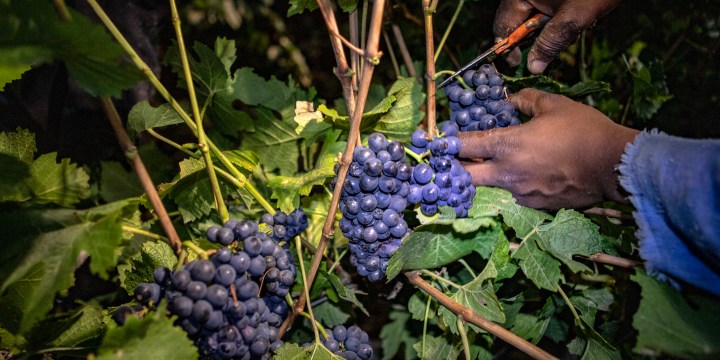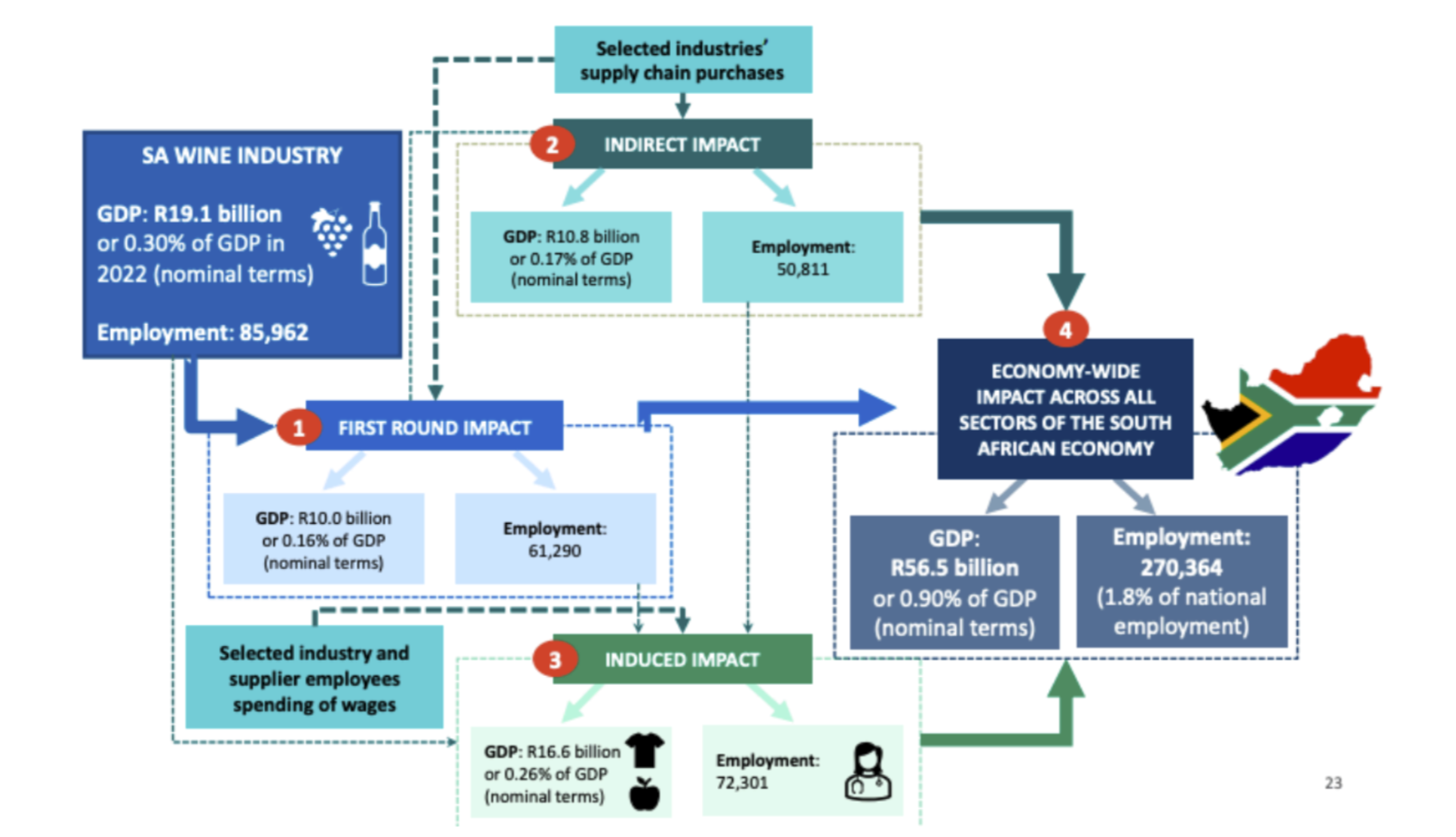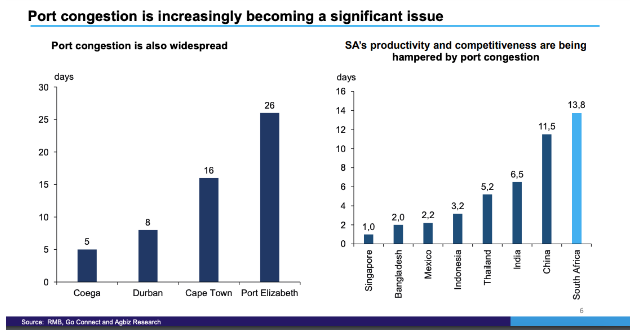GLASS HALF EMPTY
Worrying trends emerge for South Africa’s wine industry

Fewer exports, rolling blackouts, a lack of action against the illicit trade, geopolitical issues and policy uncertainty are squeezing farmers and producers dry.
South Africa’s wine industry, which marked its 365th anniversary on 2 February, is in a tight corner.
A new macroeconomic impact report on the wine and brandy industry’s impact on the economy shows it’s being shackled by logistical issues at ports, policy uncertainty, a lack of action against the illicit alcohol trade, rolling blackouts and disruptions due to geopolitical issues.
Together with the crippling Covid restrictions on economic activity, these factors are putting producers and wineries under considerable pressure, threatening livelihoods, tourism and the economy.
The latest macroeconomic impact study of the SA wine industry, conducted for the South African Wine Industry Information and Systems (Sawis) by FTI Consulting, expands on an earlier economic multiplier analysis of industry trends from 2013 to 2019 and is accompanied by a 2022 study by I and M Futureneer Advisors measuring the economic contribution of wine tourism.
The wine and brandy industry has played a significant role in rural areas, tourism, foreign revenue and the country’s brand reputation over the past 365 years, the report notes.
South Africa has more than 89,000 hectares of vineyards — mostly in the Western Cape, with minor areas under vines in the Northern Cape and other regions.
All regions have seen net declines in vineyard area over the past decade, with the Northern Cape and Klein Karoo experiencing severe losses.

(Image: SAWIS, Vinpro and FTI)
Key findings
Wine farming in the Northern Cape has plummeted, as farmers give up on grapes due to unprofitability and unpredictable weather patterns. Over the past five years, the province has uprooted 42.5 hectares for every hectare of vines planted, but 2022 was its worst year yet when only five hectares of vines were planted and 394 hectares were uprooted.
SA has lost more than 10% of its total area under vines since 2013, due to prolonged drought conditions, sharply rising cost pressures and reduced profitability. Some producers have uprooted vines in favour of more profitable crops such as citrus, plums and blueberries.
Our ageing vineyard is worrying: We’re not investing in planting new vineyards and uprooting has become a prevalent trend throughout all our wine-producing regions. In 2022, 56% of SA’s vineyard hectares were more than 15 years old, owing to cost pressures and sustained uprooting. Vines ideally bear fruit between four and 12 years old, but over half of our current vineyard area exceeds this optimal age.
Wine production costs spiked by 15.3% in 2022, more than double the 7.3% compound annual growth rate (CAGR) from 2013 to 2022, due to higher expenditures on various inputs like labour (largest contributor), fertilisers, chemicals, mechanisation and electricity.
Farmers are crippled by losses: Vinpro’s suggested net farm income — which represents profitability — has consistently exceeded the reality as loss-making among farmers rose from 28% in 2018 to nearly 40% in 2022. At the same time, the percentage of profitable farmers plunged from 20% to 12% over the same period.
Consumers are drinking more wine but of lesser quality: Wine consumption in lower price brackets (of less than R60 per litre, usually bag-in-box and Tetra packs) constitutes 83% of total domestic sales, with significant growth since 2020, the report says, although, at the top end, higher price brackets have shown some positive movement.
Wine exports are shrinking: In 2021, wine exports surged by 22% to 388 million litres, due to eased lockdowns, lower prices and larger crops, but a year later, they dipped by 5% to 369 million litres — in large part due to port constraints in Cape Town. Wine exports have been declining since 2013, with a 3.9% CAGR from 2013 to 2022. They are also below the 10-year average of exports as a percentage of local production.
Wine tourism boosts local tourism, with some regions’ local economies heavily reliant on it. In 2022, wine tourism contributed R3.05-billion to the GDP — up from the pre-Covid input of R2.4 billion. The industry directly employed 6,304 permanent workers, 4,798 peak season casual employees and 2,870 casual workers during other times in 2022.
Cash cow: The wine industry, which includes brandy, is a significant contributor to government revenue through excise taxes, with a 7.9% CAGR over the past decade. In 2022, these taxes and VAT payments totalled R9.01-billion (or 0.6% of our tax revenue). Excise taxes on wine, sparkling wine and brandy have outpaced CPI inflation since 2013. The wine industry contributes R0.7-million to GDP for every R1-million capital investment (outperforming the national average of R0.49 million) and generates 3.36 jobs for every R1-million capital investment, which is more than double the national average of 1.18 jobs.
Multiplier effect: The industry is an employment multiplier, by supporting 7.51 jobs per R1-million wine output. In the Western Cape — where the industry is concentrated — it employed 245,128 people and added R50.9-billion to the provincial GDP. The industry in the Northern Cape, which is showing a startling decline, supported 7,333 jobs in 2022.
Agricultural economist Wandile Sihlobo, contextualising the sector in an environment of weak global growth, geopolitical tensions and SA’s modest prospects, called for urgent attention to the calamity at the country’s ports and rail system, saying criminality has destroyed Transnet’s infrastructure and exacerbated the crisis.
Citing Agbiz/IDC Agribusiness Confidence Index results for Q4 of 2023, Sihlobo highlighted the intensified delays and inefficiencies at the ports, rising crime, deteriorating rail and road infrastructure, worsening municipal service delivery, rising protectionism in key export markets, increased geopolitical uncertainty and persistent episodes of rolling blackouts.
“Some of the challenges are beyond South Africans’ control, but the majority are within South Africans’ control. Hence, ahead of the elections and as manifestos are unveiled, it will be interesting to hear if these issues are raised by the various political parties and what policy actions are proposed to deal with them.”

South Africa Wine CEO Rico Basson told media at the launch that despite the industry’s numerous challenges, wine tourism was a resilient lifeline for the sector and offered hope for the economy as it grew from 14.7% in 2019 of total winery turnover to 17.3% in 2022, contributing R9.3-billion to the economy.
He said wine tourism had a profound impact on the industry’s approximately 400 micro and small wine cellars (out of a total of 523 wineries), with 36.3% of their total derived from wine tourism experiences.
“In the face of adversity, these numbers affirm the enduring appeal of South Africa’s wineries and the integral role of wine tourism in sustaining the heartbeat of our industry.”
Last week, export body Wines of South Africa reported a dramatic drop in wine exports, which were down by 17% in dollar terms in 2023. Production volumes were down by 14%.
Exports volumes to SA’s two largest markets, the UK and Germany (which account for about half of total wine exports) were down by 3% and 16%, respectively.
The biggest slump in demand was from the US market, which imported about 50% less volume in 2023 than it did in 2022. DM

















 Become an Insider
Become an Insider
If we add political uncertainty and farmers security into the mix, the picture looks even worse…. With one party holding 16%of the votes calling for “death to the farmer” one is not surprised that many are seeking greener pastures or not investing in new growth for long term prospects that wont materialise!
Many factors are causing the problems in this industry but that wrecking ball supreme, Nkosazana Dlamini-Zuma, caused huge damage with her mindless Covid restrictions which suspended exports of wine. This went on long enough to result in cancelled overseas contracts and a severe international loss of faith in what has always been an exemplary major income earner and employer in South Africa. The situation is exacerbated by the near total collapse of Transnet brought about by continuous ANC cadre deployment of useless people into top management positions. SA is paying dearly for disastrous governance by the rotten ANC cabal under Ramaphosa.
Thanks for a informative and interesting article on the state of the SA wine industry. The introductory paragraph talks of “lack of action against the illicit alcohol trade”, only there is no further elaboration on this fact? Also, surprised the industry did not taken advantage of the Chinese Australian wine ban, which has only now has been lifted after four years.
Wandile is a great writer
In the small “foreign” sections of French supermarkets (where French people buy 70% of their wine) it is difficult to find SA wine now, where 10 years ago it was common. It has been swept aside by Argentina, Australia and Chile.
One reason is a long standing and ridiculous battle against Cognac imports in SA, dating back to the days of KWC. French importers say if you ban our spirits, we boycott your wine.
Absolutely true that much of the impediments and constraints are domestically-based. For instance, energy reliability, rail and ports failures need the pragmatic intervention of the government of the day. These are some of the fundamentals that require urgent attention. The million-rand question is do we have a government with requisite political will and determination to attend to these?
More government intervention is the last thing needed, rather less government involvement in SOEs and more private enterprise.
We can expect exports to the US and some other Western countries to sharply decline even further given the ANC’s overt hostility to Western interests on the International scene. Why should they buy our wine when we take cases to the ICJ despite these nations warning us not to? Welcome to the failed State of SA.